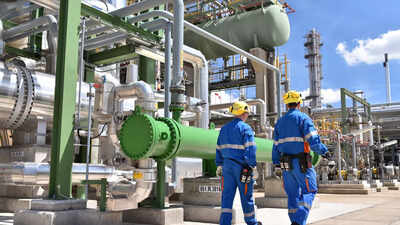- News
- Education News
- Careers News
- Engineering News
- Chemical Engineering Course - Course Duration, Top Colleges, Entrance Exams
Trending
This story is from September 6, 2022
Chemical Engineering Course - Course Duration, Top Colleges, Entrance Exams
Chemical engineering is a subfield of engineering that deals with planning, building, regulating, overseeing, installing, and running chemical manufacturing facilities and equipment. Chemical engineering also has to do with the invention of new techniques or modes of production. It is one of the broadest engineering specialties.

Chemical engineering is a subfield of engineering that deals with planning, building, regulating, overseeing, installing, and running chemical manufacturing facilities and equipment. Chemical engineering also has to do with the invention of new techniques or modes of production. It is one of the broadest engineering specialties.
This article aims to inform you of the various opportunities for chemical engineering courses after 12th grade, eligibility, and top institutes after completing the course, as well as whether or not you might be interested in a career in chemical engineering.
Chemical Engineering courses after the 12th
In the meantime, candidates can have a look at the chemical engineering courses after the 12th:
| Courses | Duration | Eligibility | Fees (Yearly) |
| BTech Chemical Engineering | 4 Years | Passed 12th with 50% aggregate (Science subjects) | Rs. 85,000-2,00,000 |
| BE Chemical Engineering | 4 Years | Passed 12th with 50% aggregate (Science subjects) | Rs. 90,000-1,20,000 |
| Diploma in Chemical Engineering | 3 Years | Passed 10th with 40% aggregate (Science subjects) | Rs. 20,000-45,000 |
Top Chemical Engineering colleges in India
Here are the top chemical engineering courses in India:
IIT , Madras- IIT, Kharagpur
- IIT, Bombay
- IIT, Roorkee
- IIT, Delhi
- IIT, Guwahati
- IIT, Dhanbad
- BITS, Pilani
- SRM University of Science & Technology
Chemical Engineering Courses
BTech Chemical Engineering - BTech Chemical Engineering course is a specialized degree created to recognize and address chemical-related issues in the industry. The curriculum for this course is created in a way that offers a balanced combination of theoretical information in a variety of elective and core courses, as well as courses in chemical engineering beyond the 12th grade, basic science, humanities, and practical knowledge. Engineering mathematics, fundamentals of heat, mass, and momentum transfer, thermodynamics, transport processes, chemical kinetics, and other topics are covered in the course curriculum.
BE Chemical Engineering - In B.E. Chemical Engineering, students learn the fundamentals of chemistry while also being given an engineering perspective on the challenges associated with chemical production and utilization. This topic combines science and engineering to describe problems in the manufacturing industry. Chemical process calculations, engineering chemistry, kinetics, and reactor design, process dynamics and control, environmental pollution control, biochemical engineering, corrosion engineering, and other topics are included in the course program
Diploma courses - Candidates wishing to go ahead with the diploma courses in chemical engineering should keep in mind that because it combines physical science (physics and chemistry) and life science (microbiology, biochemistry, and biology) to transform raw materials into newer products, a diploma in chemical engineering is a comprehensive option after you finish your 12th-grade education.
This course gives them an idea of how this sector works and functions efficiently. It is a thorough investigation of the options for applying mathematical and economic calculations to control the industry and generate enhanced products. The course will not only teach students about chemical science but also about its uses in human science.
Throughout the course, students are taught how to sharpen their analytical and communication abilities so that they can use them in the future.
Chemical Engineering Entrance Exams
The only way to get into good colleges for chemical engineering courses is through entrance exams. Students must pass the entrance exams held at the university, state, and national levels in addition to having the minimum required marks in Class 12 to be eligible.
JEE Main and JEE Advanced are the entrance exams that colleges like IIT hold. However, only a small number of colleges and universities hold their own entrance tests, with the majority instead accepting regional or national entrance exams. Only qualified candidates may apply for admission to the program.
The following is a list of the entrance exams offered nationwide for those wishing to enroll in a course in chemical engineering:
JEE Main- JEE Advanced
- COMEDK
- MHT CET
- GATE
- BITSAT
- VITEEE
- SRMJEEE
Chemical Engineering Scope
An entry-level Chemical Engineer in India may earn between Rs 3 and Rs 6 lakh annually. The two most important things that would affect a candidate's income are their qualifications and job experience. Below are some of the well-known positions available to chemical engineers, along with their job descriptions and salaries:
- Chemicals manufacturing industries
- Petroleum industry
- Food industry
- Rubber industry
- Textiles industry
- Paper & Pulp industry
- Aerospace industry
- Plastic industry
- Cement industry
- Public sector units
- Fertilizer industry
End of Article
FOLLOW US ON SOCIAL MEDIA










